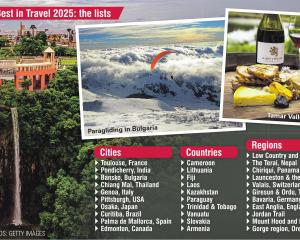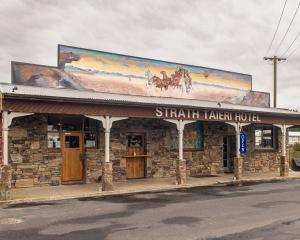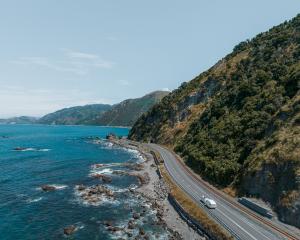With its non-tidal waters, gentle breezes and myriad sun-bleached islands, the Ionian Sea is just about the perfect casting off point for a couple of novice yachties on a flotilla holiday. Peter Donaldson explains.
The Three Windmills guarding the entrance to Kioni, on the Greek island of Ithaca are a distinctive landmark for sailors.
We'd seen them twice; once on our right, and again on our left. We weren't meant to see them at all on day one of our sailing holiday.
An hour earlier, wife Michelle and I were quite alone, circling on an eerie, flat Ionian Sea tinged with the diffused orange of a late-afternoon September sun. The heat haze masked any land features. But not the rapidly declining state of the marriage. Oh, yes, we were lost. And it was quite obviously my fault.
Fortunately, a cellphone call to our flotilla skipper, Kiwi Andy Cottle - at 23 already a four-season veteran who has heard all the excuses - had us pointing our 33ft yacht in the right direction.
"You should soon be seeing the windmills on your port side," he told us. We were only one island and two hours away from where we should have been berthed.
Day one of our two-week Sailing Holidays' Whole Ionian flotilla holiday was intended to be a languid sail/motor from Sivota, on the island of Lefkada, to Fiskardo, the northern town on Kefalonia, the island setting for Captain Corelli's Mandolin.
It all sounded so simple at the morning briefing. And it would have been had our skipper (me) and crew (Michelle) been slightly, no, make that significantly, more competent in matters navigational.
As Cottle, originally from Kerikeri, pointed out: "It's just an easy first-day sail today, about five hours, on a course of 205 deg. Take your time. Find a bay and stop for lunch and a swim."
Except I got distracted about finding a particular bay, thought I could navigate by line of sight, ignored compass readings, and, well, that night incurred the first beer fine of our two-week adventure.
We had arrived in Sivota 24 hours earlier, after an early-morning flight out of Gatwick and a one-hour coach transfer.
Our flotilla comprised 13 yachts, ranging in size from 32ft to 50ft. Our group of 39, mainly British but for some stray Kiwis, were aged from mid-20s to late-70s.
Comprising couples, foursomes and family groups, their yachting backgrounds included 15-flotilla veterans, experienced ocean sailors and weekenders.
And then there was us. Total sea-going experience: numerous ferry crossings and a handful of winter afternoons (usually becalmed) on Otago Harbour.
Our home for the next two weeks was Melissa, a Beneteau 331, capable of sleeping up to eight, but just perfect for a couple; three bedrooms, lounge, shower, toilet, and kitchen.
Or in nautical parlance, cabins, saloon, heads and galley.
After settling in and ticking off the inventory (ah, what's a warp?), we headed to a group briefing with the skipper, engineer and hostess of lead boat Elpida ... in a bar. This was to become a recurring theme.
Cottle took us through his vision for the fortnight, the dos and don'ts, tips and suggestions. His equally young engineer, Josh Mitchell, from Brisbane, explained things mechanical, with more dos and don'ts, before another 20-something, Claire Plunkett, from Sydney, outlined the social calendar, a list laden with plenty of dos.
While laid-back and obviously up for a party, there was a comforting underlying professionalism and confidence about the trio. Later in the afternoon after a one-on-one on-board briefing we felt relaxed and more certain. That night, the words "lulled", "false", "sense" and "security" never entered our heads.
The flotilla concept is simple. Each morning the lead crew runs through the day's route, warns of any potential hazards (ferries the size of cruise liners, poorly charted reefs), expected wind conditions (usually gentle from the north about noon), places of interest, afternoon berthing plans, and the best places to eat and drink that evening.
Unlike other flotilla companies, London-based Sailing Holidays believes in plunging its clients into the Greek islands yachting experience from the first cast-off. Morning briefing over (cellphone charged, lunch supplies packed away, sunblock applied, radio check completed), the lead crew sees each yacht away .
Yes, you are on your own; no mother duck to follow.
As we eased out of Sivota under a rapidly warming sky there was a good feeling aboard Melissa. We even congratulated ourselves on a departure well executed. An hour or so later, Elpida passed us, way off to our right ... heading to Fiskardo.
Discretion is also an attribute of lead crews, we learned at the group dinner that evening at the quay-side Captain's Cabin, in Fiskardo.
"Oh, it was you," said a fellow diner, as we sheepishly owned up to our earlier incompetence.
"We heard someone was lost but they wouldn't tell us who."
Three courses and post-dinner drinks later, we had heard many other tales of ineptitude.
We had also been gently, discreetly and sympathetically offered some excellent advice. Our sailing holiday - and marriage - were back on an even keel, so to speak.
Sometimes our day's destination was no more than a few miles away, but usually between eight and 12. That was the direct route; some keener yachties took longer as they went in search of wind.
Waipu Cove couple Andy and Lorna Duncan, sharing Annabelle with Lorna's brother, ex pat retired pilot Richard Brownie and his wife Camilla, chased the wind daily, clocking up nearly 300 miles during the fortnight.
We chose less adventurous routes over the vivid turquoise greens and electric blues of the Ionian, staying close to land, finding mostly deserted bays (beware the naturists), swimming in translucent 25degC waters, eating and lazing. And if the moods and winds were right in the afternoon, we would set a sail (just one to start with), switch off the engine and slap and flap our way towards that day's berth.
We eased and breezed our way around the islands of Lefkada, Kefalonia, Ithaca, Kalamos and Meganisi in the south before heading north through the Lefkas Canal to Paxos and the mainland anchorages of Parga, Sivota Mourtos and Plateria, overnighting in some gems of settings, several remote enough not to rate a mention on a traditional tourist map.
By the second week, we had gained more confidence and competence.
Our berthing and anchor skills were often something to be envied.
Michelle's pre-flotilla vision of lying on the deck, taking in the sun, and sipping cocktails was almost a reality. Happy, happy days.
Ashore, where cash is king, we enjoyed excellent Greek fare in movie-set tavernas: a tasty starter of stuffed peppers or grilled feta for €4.5 ($NZ7.50), or a no-frills grilled octopus main for €11 ($18). And always served with plenty of bread.
Bottled beer costs €4.50-5, a pitcher of wine €5-6, cocktails from €7-8.
Occasionally, some of the prices put a new meaning to the phrase Greek financial crisis - more than €60 ($98) for a basic two-course meal for two with a couple of drinks.
Add in daily breakfasts, lunch supplies, litres and litres of bottled water and juices, plus ancillary expenses such as watertank refills, harbourside showers, and our €100 ($160) daily budget was constantly challenged.
Our flotilla companions proved great company. Early nights became late nights, the laughter longer and louder, the stories bolder and braver.
If there were memories made ashore, they were equally matched on the water. Perhaps the most memorable, and our crowning achievement, was the run on the penultimate afternoon from Parga to Sivota Moutos.
With a nor'west breeze filling our sails, we had Melissa heeled over and carving through the bright blue waters at an exhilarating pace.
Michelle was smiling.
"Can we go faster?", she asked.
At a glance
The Greek sailing season runs from May to October. Winds are fresher at either end of the season and more suited to experienced yachties.
Top tips: Start with basics of navigation and carry a hand-held GPS; take half the clothes you think you'll need; cash is king, but ATMs scarce, especially on southern islands.
Peter and Michelle Donaldson paid for their flights from New Zealand to Greece.
A two-week sailing holiday for a couple starts from €735 (about $1500) per person, including flights from the UK. For more details: sailing holidays.com












